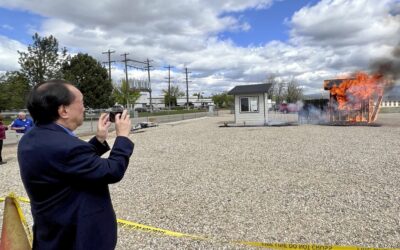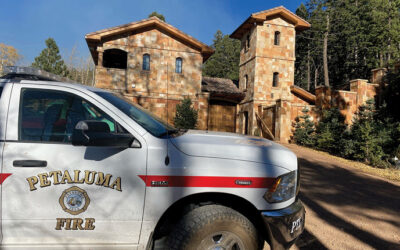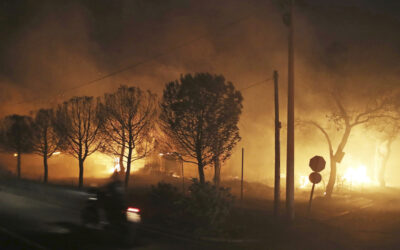LAHAINA—A top federal fire official warned that Hawaii’s firefighters are under considerable strain and that Hawaii residents need to be aware of the risks and begin making fire survival plans for themselves and their communities as the risks become more evident.
“There are not enough firefighters, we’ve already established that, ” U.S. Fire Administrator Lori Moore-Merrell told the Honolulu Star-Advertiser on Saturday.
Moore-Merrell said that the “baseline ” risk for Hawaii has fundamentally changed as drought, climate change, invasive species and increasing wind storms create new dangers. She warned that there’s tremendous strain on Hawaii’s firefighting force.
“They can’t get there fast enough, you need to know how to make yourself saveable until they can get there to you, ” she said. Residents need to know how to get away from fire safely, she said.
The U.S. government’s top fire safety official, Moore-Merrell was in Hawaii this week meeting with local and federal relief officials, as well as local firefighters who responded to the August Maui fires as the government plans for the future of wildfire response.
The visit came as firefighters across the islands spent a week responding to fires on Maui, Oahu and Hawaii island at a time officials hoped that the rainy season would help quell the flames.
During a sit-down with Maui Fire Department firefighters Saturday at Lahaina’s firehouse, Moore-Merrell and local fire crews discussed the events of the Aug. 8 fire and challenges they have continued to face as they deal with small fires in a community suffering deep trauma after the blaze that destroyed most of the historic town and killed at least 100 people in the deadliest U.S. wildfire in a century.
Over the course of her trip to Hawaii, Moore-Merrell also met with the state’s fire chiefs as they gathered Friday on Kauai for a leaders conference to discuss the outlook for fires in the state. She also went to a site on the island where the Department of Homeland Security’s science and technology division has been testing a new sensor to detect smoke and fire heat as an early detection system.
“The sensor has been positioned on Kauai as a test so that we can see what kind of data its capturing, understand if there are false positives, all of the typical things that you would do with a technology device, ” said Moore-Merrell. “We’re getting really good reports, very good reports from the center, and good accuracy. So we’re very, very happy about that.”
She said that the tests began on Kauai because federal officials had access to land and infrastructure to begin quickly testing it on the island, but that they hope to soon deploy them across the state.
“We will be bringing over and deploying additional sensors throughout the islands, ” said Moore-Merrell. “So we are going to focus on risk. … We met with the governor’s people just last night and the first thing I asked for them to deliver is the risk assessment of where they’re at the highest risk across the islands for wildfire. And that’s where we’re going to focus on deploying these sensors.”
While in Lahaina on Sunday she got a briefing from the Environmental Protection Agency on lithium ion batteries and technology being found across the Lahaina burn zone that are presenting problems for cleanup.
“Not just in electric vehicles or hybrids, but also any home that had solar panels would have also had what we call a battery energy storage system, that would have been a panel about the size of (a ) wall that have hundreds of cells in it of lithium ion technology, ” said Moore-Merrell. “Many of those, even though the home burned, those systems were still charged. So they cannot start debris removal until those walls are removed and de-energized.”
She said that it’s a new challenge that fire officials haven’t grappled with.
“There is no national protocol, ” Moore-Merrell told the Star-Advertiser. “This is one of those we’re learning from this event. And so I wanted to evaluate what they’re doing, and help understand that protocol.”
In Lahaina as she talked with local firefighters, they discussed the challenges posed by increasing temperatures and droughts, and how economic challenges in Hawaii have created unique dangers. One firefighter said that Hawaii is becoming “ground zero ” for the affordable housing crisis and that has contributed to crowded housing as people pack into rooms and houses to lower their rents.
Firefighters also expressed concerns about what comes next in Lahaina.
“One of the things that I said to the governor, and that I always say very loudly to anybody and I’m going to continue to say, as Lahaina rebuilds, we must look at building codes, ” Moore-Merrell told firefighters.
“You’re gonna have builders who are going to come in and say we will do it faster and cheaper. We get people back in their homes, businesses reopen, we do faster, cheaper and (asking for ) more relaxed building codes, ” Moore-Merrell warned. “These codes are based on science. It’s not like it’s beyond us.”
___
(c)2023 The Honolulu Star-Advertiser
Visit The Honolulu Star-Advertiser at www.staradvertiser.com
Distributed by Tribune Content Agency, LLC.




